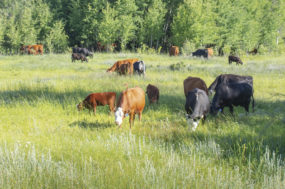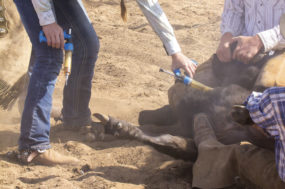As the drought that grips the cattle industry persists, producers should be asking themselves whether the drought will continue for the foreseeable future and does the tax code provide them any financial relief.
I will address both of these questions in this article.
At the 2011 Beef Financial Management Conference held Oct. 6 in Amarillo, John Nielsen-Gammon, professor of meteorology at Texas A&M University and Texas state climatologist, stated that there is a strong possibility the drought conditions experienced over the past year will continue for the next two years at a minimum.
The worst-case scenario he presented indicates the region is susceptible to continuing drought conditions for another five to 15 years (to view his presentation and others presented at the Beef Financial Management Conference, go to www.cpe-conference.com/conferencepresentations.html).
With producers culling herds at a historic rate, all producers should consider their specific situations independently of others and begin or continue to plan for the financial ramifications of these historic conditions and events by electing to defer gain as appropriate.
In general, producers who sell more livestock than normal are divided into the following categories:
- Those who sold draft or breeding animals
- Those who sold livestock
Producers wishing to take advantage of relief due to either situation must first demonstrate that weather-related conditions resulted in the excess sales.
The difference in whether you qualify for special tax treatment under either category depends upon the severity of the weather event from the perspective of the federal government.
A producer falling under the “draft or breeding animal” category must only demonstrate that drought conditions existed that caused the sale of excess animals.
Conversely, to qualify under the “any livestock” category, the producer must demonstrate that his or her area has received a disaster declaration made by the federal government.
Once you’ve determined which category you fall under, the next issue to address is the extent to which you made excess sales in any year due to weather conditions.
The federal government views these excess sales as an involuntary conversion of assets. So, for example, if it is your usual business practice to sell five of your draft or breeding animals during the year, but you sold 20 in the current year due to the drought, the gain from the sale of 15 animals is treated as an involuntary conversion and eligible for deferral of gain.
Finally, depending upon the category in which you fall, you have a number of years in which you can defer the gain from the excess sales.
If you fall under the draft or breeding animal category, you may defer the gain for up to two years and not recognize any gain if the proceeds are used to purchase replacement animals for the same purpose within that period.
If you live in a federally declared disaster area, the deferral provision for any excess livestock sold extends to four years; the IRS may extend the replacement period on a regional basis, if the weather-related conditions continue for longer for three years.
Note, however, that under either category, if it is not practical for you to reinvest the sale proceeds in animals for the same purpose, you can treat other property (excluding real property) used for farming purposes, as property similar or related in service or use to the livestock you sold.
In closing, the option to defer gain resulting from the extreme weather conditions experienced in the past year is only a part of your overall financial plan.
For example, another tool you can leverage during these almost unprecedented times is products offered by the USDA’s Risk Management Agency (RMA).
The RMA offers insurance that provides economic protection and risk management for cattle producers primarily through federally sponsored insurance delivered and serviced by private insurance companies.
William J. Murphy, administrator of the RMA, detailed these products at the 2011 Beef Financial Management Conference previously mentioned.
No matter what options you choose, consulting with your financial advisers early and as often as needed should be a top priority. ![]()
PHOTO:
Jason Thomas, CPA, JD, has legal, investment banking and accounting experience with agribusiness industries with Frost, PLLC in Little Rock, Arkansas.








